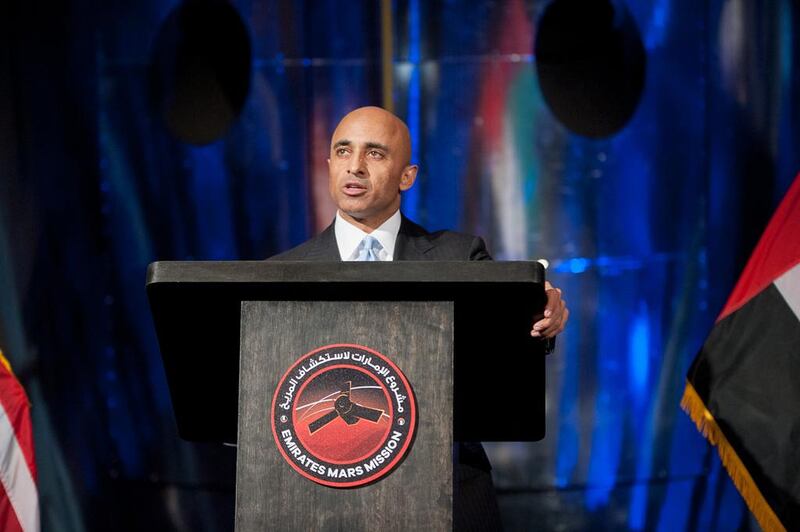WASHINGTON // The UAE Space Agency’s Mars mission, slated for 2020, is aimed at providing inspiration in a time of turmoil and encouraging young people across the Middle East to pursue careers in science and technology, the country’s ambassador to the United States has said.
“This is the Arab world’s version of president Kennedy’s moon shot – it’s a vision for the future that can engage and excite a new generation of Emirati and Arab youth,” Yousef Al Otaiba said during a National Day event at the Smithsonian’s National Air and Space Museum in Washington.
“The UAE Mars mission serves as much more than a scientific and technological break through. It’s a signpost for future generations – both in the UAE and across the region – that says anything is possible.”
The UAE has ramped up its space programme since launching its first satellite in 2009, investing over US$5.5 billion (Dh20.2bn) in exploration efforts, according to the Space Agency’s Director General Mohamed Nasser Al Ahbabi, who also spoke at the event on Wednesday evening.
The agency is planning to launch its Al Amal probe to Mars in 2020, which would enter the planet’s orbit in 2021 and coincide with the UAE’s 50th anniversary.
“The Emirates Mars mission is the first space exploration mission to be launched by an Arab country and we are confident the mission and space programme will accomplish great things,” Mr Al Ahbabi said.
“Our vision is that this project will help the development of the UAE’s economy, support local, regional and international space study and technology and create exciting new learning opportunities.”
The National, in partnership with the Space Agency and other organisations, last week launched a space programme of its own, giving high school and university students the chance to help shape the future of space exploration by entering one of two contests.
The first, named Genes in Space, challenges high school pupils to create a DNA analysis experiment that can be used in a microgravity environment of the international space station and applied to space exploration problems, while the second, the Satellite Launch project, asks teams of university students to build a satellite. The winners of both competitions will be flown to the US to watch their projects launched into space.
The UAE’s growing focus on space exploration is also intended to affect the region.
“We’re trying to create a new ideology of opportunity and optimism in a region that has seen too little of both for far too long,” Mr Al Otaiba said, adding that, “this stems from our belief that it is possible to be Muslim, moderate and modern all at the same time.”
The probe would be Mars’ first weather satellite, collecting data on the planet’s weather and atmosphere in order for scientists to better understand how its climate has evolved, according to the UAE Embassy.
The Mars mission is slated to lead to greater collaboration in space exploration between the US and UAE, and Mr Al Ahbabi met with Nasa officials earlier this week. The goal is for the UAE to be one of the countries involved in international efforts to put humans on Mars.
“We will explore faster and further as partners ... [and] we are closer than we have ever been in history to sending humans to the red planet,” said Ellen Stofan, Nasa’s chief scientist, speaking alongside the UAE Ambassador and Mr Al Ahbabi.
“Unlike the Moon landing, this time one country will not go it alone – the United States will need a contingent of international partners to explore Mars.”
Ms Stofan added that the mission to have humans explore Mars is one of science’s most anticipated goals because scientists have determined that it is the most likely place to find evidence of life beyond Earth, especially with the recently discovered evidence of water.
The UAE Embassy’s annual National Day event was attended by several hundred guests.
tkhan@thenational.ae





